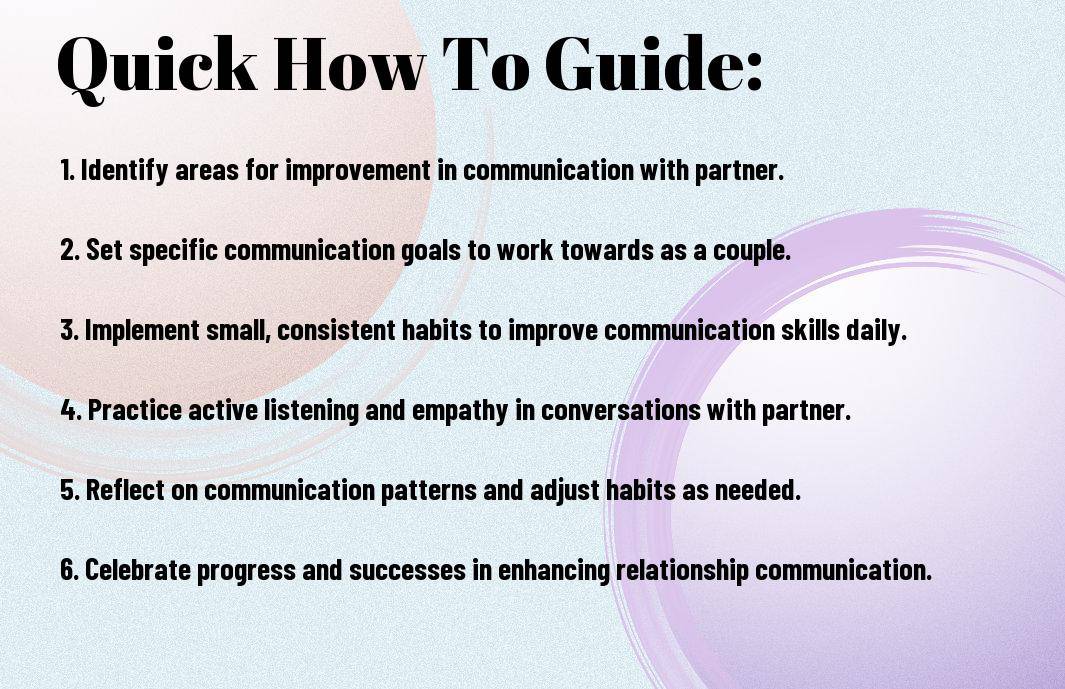Improving communication in relationships! Relationships thrive on effective communication, and cultivating good communication habits can positively impact all types of relationships. Whether you’re looking to deepen your connection with a partner, family member, friend, or colleague, honing your communication skills is crucial. In this blog post, we will explore how implementing Atomic Habits can help you improve communication in your relationships.
Key Takeaways:
- Set clear communication goals: Define what you want to achieve in your interactions with your partner.
- Practice active listening: Focus on understanding your partner’s perspective before responding.
- Establish communication rituals: Create habits like daily check-ins or weekly relationship reviews to enhance communication.
- Use positive reinforcement: Acknowledge and appreciate good communication habits in your partner.
- Eliminate distractions: Minimize external interruptions during important conversations to improve focus.
- Be intentional with your words: Choose your language carefully to convey your message effectively and avoid misunderstandings.
- Seek feedback and make adjustments: Regularly assess your communication dynamics with your partner and make necessary changes for better understanding.

Understanding Atomic Habits
Some of the most powerful changes in our lives come from making tiny adjustments to our habits. In communication in relationships, these small changes can have a big impact on how we connect with our partners. By understanding the principles of Atomic Habits, we can cultivate stronger, healthier relationships.
The Fundamentals of Atomic Habits
With Atomic Habits, the focus is on making small, consistent changes that compound over time. Rather than trying to overhaul our communication style in one go, we can break it down into manageable steps. By setting specific, achievable goals and being mindful of our habits, we can lay a solid foundation for better communication in our relationships.
The Role of Tiny Changes in Communication
Atomic Habits teaches us that even the smallest adjustments in our behavior can lead to significant improvements. In the context of communication, this means that by making tiny changes in how we express ourselves, listen to our partners, or respond to conflicts, we can transform the quality of our interactions. These subtle shifts can create a ripple effect, gradually strengthening the bond between partners and fostering a deeper sense of understanding and connection.
Plus, by honing in on these micro-changes, we can avoid feeling overwhelmed or discouraged by the daunting task of completely revamping our communication habits. Instead, we can focus on the power of small steps taken consistently over time, knowing that these seemingly minor adjustments can lead to major breakthroughs in our relationships.

Laying the Foundation for Better Communication
Despite our best efforts, effective communication in relationships can sometimes feel like a struggle. Whether it’s a significant other, family member, or friend, misunderstandings and miscommunications can create tension and hinder our connections. However, by focusing on building strong communication habits, we can lay a solid foundation for healthier relationships.
Recognizing Communication Patterns
Assuming that communication patterns are fixed can be a roadblock to improving interactions with others. Take time to observe and identify the recurring themes in your conversations. Are there certain phrases or behaviors that tend to trigger conflict? By recognizing these patterns, you can begin to address them proactively and work towards more effective communication.
Establishing a Baseline for Improvement
An crucial step in enhancing communication is to establish a baseline for improvement. This means taking note of how communication currently flows in your relationships. Are there frequent misunderstandings or unexpressed feelings? By acknowledging where you currently stand, you can create a clear starting point for implementing positive changes.
By setting an initial benchmark, you can track your progress as you work towards better communication habits. Reflect on both the strengths and weaknesses in your communication style and be open to making adjustments for improvement.
Practical Tips for Enhancing Dialogue
Keep communication channels open and thriving with these practical tips to enhance dialogue in your relationships. By implementing simple strategies, you can foster better communication habits that will strengthen your connections.
- Practice active listening by giving your full attention to the speaker.
- Cultivate empathy by trying to understand the other person’s perspective.
- Use positive language to express yourself clearly and kindly.
- Be open to feedback and willing to address any communication challenges that arise.
Recognizing the importance of effective communication is key to building and maintaining healthy relationships. For more insights on improving communication habits, check out Why Everyone Should Read “Atomic Habits” by James Clear.
How to Listen Actively and Empathetically
On the journey towards better communication, active listening and empathy play crucial roles. By actively engaging in conversations and empathizing with others, you can strengthen your bond and deepen your understanding of each other.
The Art of Expressing Yourself Clearly and Kindly
Expressing yourself clearly and kindly is an important component of effective communication. When you articulate your thoughts with clarity and compassion, you create a safe and supportive environment for open dialogue.
Overcoming Common Communication Barriers
Now, effective communication is the cornerstone of a healthy relationship. However, various barriers can hinder smooth communication between partners. These barriers may include poor listening skills, defensiveness, misunderstandings, and differences in communication styles. To foster better communication in your relationship, it’s necessary to address and overcome these common obstacles.
Strategies to Break Down Walls in Conversations
Assuming positive intent: Instead of jumping to conclusions or assuming the worst about your partner’s words or actions, try to give them the benefit of the doubt. Active listening: Show genuine interest in what your partner is saying by giving them your full attention and repeating back what you heard to ensure understanding. Expressing emotions: Be open about your feelings and encourage your partner to do the same to promote authenticity in your conversations.
How to Rebuild After Misunderstandings
Assuming misunderstandings are bound to happen in any relationship, focus on resolving them constructively rather than assigning blame. Apologize when necessary: Take responsibility for your part in the misunderstanding and offer a sincere apology if needed. Engage in open dialogue: Discuss the issue calmly, listen to each other’s perspectives, and work together to find a resolution.
The process of rebuilding after misunderstandings can strengthen the bond between partners and enhance communication skills for future interactions. It’s important to learn from mistakes, forgive, and move forward with a renewed understanding of each other’s needs and communication preferences.
Conversations are the building blocks of any relationship, and by actively working to overcome communication barriers and rebuild trust after misunderstandings, you can cultivate a deeper connection with your partner.
Factors That Influence Communication Habits
For any relationship to thrive, communication plays a vital role. Understanding the factors that influence our communication habits can lead to significant improvements in how we connect with others.
Identifying External Influences on Communication Styles
Communication is not just about the words we say; it is also shaped by external influences. These influences can include the environment we are in, our upbringing, cultural background, and even societal norms. Recognizing and understanding these external factors can help us navigate conversations more effectively and with greater empathy.
The Impact of Personal Beliefs and Values on Dialogue
While external influences play a significant role in our communication habits, personal beliefs and values also shape how we engage with others. Our beliefs can influence our opinions, attitudes, and the way we interpret information. Recognizing the impact of our personal beliefs can help us better understand our communication style and adapt it to foster healthier connections.
Another critical aspect to consider is that our personal beliefs and values can sometimes act as barriers to effective communication. It is imperative to be aware of how our beliefs may influence our interactions and be open to challenging and evolving them to improve our communication habits.
Long-Term Strategies for Relationship Growth
Not all improvements in communication happen overnight. Long-term strategies are vital for fostering healthy and lasting relationships. By implementing consistent habits and routines, you can strengthen the connection with your partner and promote effective communication over time.
Setting Milestones for Communication Improvement
Clearly defining milestones for communication improvement can help both partners stay on track and monitor progress. Whether it’s setting a goal to have a weekly check-in or committing to active listening during disagreements, milestones provide a roadmap for growth.
Celebrating Progress and Reinforcing Positive Habits
Communication is a two-way street, and it’s important to acknowledge and celebrate the strides made in improving this aspect of your relationship. By celebrating progress, you strengthen the foundation of your bond and reinforce positive communication habits.
A relationship that thrives is one where both partners feel heard, understood, and valued. Celebrating progress along the way can motivate you and your partner to continue making efforts towards enhancing communication and nurturing a strong and healthy partnership.
Final Words
Following this 3 Lessons from Atomic Habits, it becomes clear that incorporating small changes can have a significant impact on improving communication in relationships. By understanding the power of habits and making intentional efforts to cultivate positive communication habits, you can create a more harmonious and fulfilling connection with your partner or loved ones.
Note, consistency is key when it comes to implementing these changes. Small, incremental improvements over time can lead to big results in enhancing the quality of your relationships through effective communication practices. Focus on building these habits one step at a time and watch as your relationships thrive and grow stronger.
FAQ
Q: Why is communication important in relationships?
A: Communication is important in relationships because it helps in understanding each other better, resolving conflicts, building trust, and strengthening the bond between partners.
Q: How can atomic habits help improve communication in relationships?
A: Atomic habits focus on making small, incremental changes to improve communication skills consistently over time, leading to better understanding and connection with your partner.
Q: What are some atomic habits that can enhance communication in relationships?
A: Some atomic habits to enhance communication include active listening, expressing appreciation, practicing empathy, setting aside dedicated time to talk, and using “I” statements to express feelings.
Q: How can active listening improve communication in relationships?
A: Active listening involves fully concentrating, understanding, responding, and remembering what your partner has said, which can lead to clearer communication, fewer misunderstandings, and deeper connection.
Q: How does expressing appreciation contribute to better communication in relationships?
A: Expressing appreciation can create a positive atmosphere, boost morale, reinforce good behavior, and encourage open communication and mutual respect between partners.
Q: Why is practicing empathy important for effective communication in relationships?
A: Practicing empathy helps you understand your partner’s perspective, feelings, and needs, fostering compassion, trust, and emotional connection, which are important for effective communication in relationships.
Q: How can setting aside dedicated time for communication strengthen relationships?
A: Setting aside dedicated time for communication shows your commitment to the relationship, provides a safe space to address concerns, share thoughts and feelings, and deepen intimacy and understanding with your partner.



